初中英语语法形容词
初中英语语法---形容词
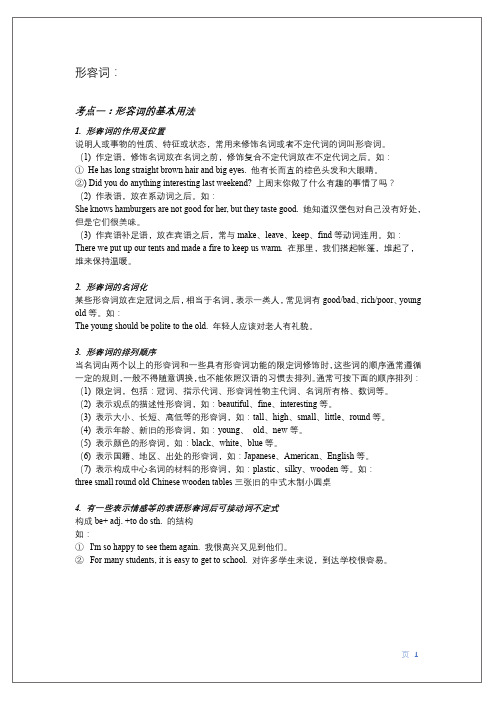
形容词:考点一:形容词的基本用法1. 形容词的作用及位置说明人或事物的性质、特征或状态,常用来修饰名词或者不定代词的词叫形容词。
(1) 作定语,修饰名词放在名词之前,修饰复合不定代词放在不定代词之后。
如:①He has long straight brown hair and big eyes. 他有长而直的棕色头发和大眼睛。
②) Did you do anything interesting last weekend? 上周末你做了什么有趣的事情了吗?(2) 作表语,放在系动词之后。
如:She knows hamburgers are not good for her, but they taste good. 她知道汉堡包对自己没有好处,但是它们很美味。
(3) 作宾语补足语,放在宾语之后,常与make、leave、keep、find等动词连用。
如:There we put up our tents and made a fire to keep us warm. 在那里,我们搭起帐篷,堆起了,堆来保持温暖。
2. 形容词的名词化某些形容词放在定冠词之后,相当于名词,表示一类人,常见词有good/bad、rich/poor、young old等。
如:The young should be polite to the old. 年轻人应该对老人有礼貌。
3. 形容词的排列顺序当名词由两个以上的形容词和一些具有形容词功能的限定词修饰时,这些词的顺序通常遵循一定的规则,一般不得随意调换,也不能依照汉语的习惯去排列。
通常可按下面的顺序排列:(1) 限定词,包括:冠词、指示代词、形容词性物主代词、名词所有格、数词等。
(2) 表示观点的描述性形容词,如:beautiful、fine、interesting等。
(3) 表示大小、长短、高低等的形容词,如:tall、high、small、little、round等。
初中英语语法--形容词和副词
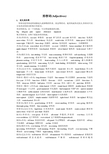
形容词(Adjectives)I.定义及分类形容词是用来说明或描述人或事物的性质、状态等的词。
就其构成形式而言,形容词可以分为单词形容词和复合形容词。
单词形容词:由一个词构成,可以带前缀或者后缀。
big diligent pale square dishonest impatient复合形容词:由两个或更多的词构成。
名词+形容词:sea-sick 晕船的air-sick 晕飞机的ice-cold 冰冷的duty-free 免税的snow-white 雪白的blood-thirsty 残忍的world-wide 世界性的shake-proof 防震的water-tight 不漏水的knee-deep 及膝的toll-free 免利息的top-heavy 头重脚轻的名词+名词-ed:iron-willed 意志坚强的ox-eyed 大眼睛的honey-mouthed 甜言蜜语的apple-shaped 苹果形状的lion-hearted 勇敢的silver-haired 银发的hook-nosed 勾鼻子的名词+现在分词:law-abiding 守法的time-consuming 耗费时间的self-sacrificing 自我牺牲的peace-loving 爱好和平的face-saving 顾面子的English-speaking 讲英语的pleasure-seeking 寻欢作乐的heart-rending 令人心碎的soul-stirring 感人肺腑的epoch-making 划时代的man-eating 吃人的fault-finding 喜欢挑剔的labor-saving 节省劳力的mouth-watering 令人垂涎的名词+过去分词:weather-beaten 饱经风霜的heart-felt 衷心的heart-broken 伤心的hand-made 手工的home-made 本国造的state-owned 国有的sugar-coated 糖衣的tongue-tied 结结巴巴的形容词(数词)+名词:long-distance 长途的fine-manner 举止优雅的present-day 当前的five-year 五年的bare-foot 赤脚的first-rate 一流的second-rate 二流的first-class 头等的deep-sea 深海的half-price 半价的one-way 单向(通行)的part-time 兼职的形容词(数词)+名词-ed:white-haired 白发的round-faced 圆脸的double-faced 两面派的teen-aged 十几岁的good-mannered 有礼貌的bad-tempered 坏脾气的narrow-minded 心胸狭窄的noble-minded 品格高尚的kind-hearted 心地善良的absent-minded 心不在焉的smooth-tongued 花言巧语的short-sighted目光短浅的near-sighted 近视的simple-minded 头脑简单的tight-fisted 吝啬的far-sighted 眼光远大的warm-hearted 热心的形容词+现在分词:good-looking 好看的sweet-smelling 好闻的easy-going 随和的thorough-going 彻底的fine-sounding 好听的形容词+过去分词:high-born 出身高贵的ready-made 现成的ready-cooked 烧好的native-born 本地生的new-built 重建的副词+形容词:ever-green 常青的all-round 全能的,全面的over-busy 太忙的over-credulous 过于轻信的over-critical 过于挑剔的(=hypercritical)副词+名词:off-hour 休息时间的off-guard 失去警惕的off-campus 校园外的off-key 不协调的off-budget 预算外的on-line 在线的副词+现在分词:ever-lasting 持久的on-coming 迎面而来的up-coming 即将来临的well-meaning 善意的far-reaching 深远的ever-increasing 不断增加的never-ending 不断的high-ranking 高级的副词+过去分词:well-known 著名的ill-mannered 举止粗鲁的well-behaved 表现好的well-informed 消息灵通的well-balanced 平衡的well-dressed 穿着时髦的badly-wounded 重伤的wide-spread 广泛流传的newly-built 新建的widely-used 广泛使用的well-equipped 装备精良的newly-married 新婚的形容词+形容词:red-hot 炽热的dark-green 深绿的bloody-red 血红的过去分词+介词:unthought-of 没有想到的unpaid-for 没付款的undreamed-of 连做梦也没想到的longed-for 渴望的uncalled-for 未被请求的unlooked-for 非期待的most-talked-about 谈得最多的yet-unheard-of 尚未听说过的(unheard-of=unprecedented)动词(过去分词)+副词:carry-on 随身携带的built-in 嵌入的cast-off 丢弃的drive-in 开车进去的unlived-in 没人住的其他类型:heart-to-heart 推心置腹的well-to-do 富裕的well-off 富裕的down-to-earth 讲究实际的life-and-death 生死攸关的根据其句法功能可以分为定语形容词,表语形容词和通用形容词:定语形容词:1. 起强调作用或特指作用的形容词: actual age chief cause main idea mere child only reason principal food sheer nonsense sole purpose total number2. 由名词转化而来的形容词:atomic energy, criminal law golden opportunity medical college表语形容词:1. 某些以a-开头的形容词: afraid alert alike alive alone aloof ashamed asleep astir awake aware2. 表示健康状况的形容词: faint ill well unwell注:ill作定语时,意为“坏的,邪恶的,恶劣的”如:ill luck/name/news/temper/wound等。
初中英语语法 形容词在修饰情感时有哪些常用词汇

初中英语语法形容词在修饰情感时有哪些常用词汇初中英语语法知识点:形容词在修饰情感时的常用词汇形容词在修饰情感时,可以用一些常用的词汇来表达不同的情感。
以下是一些常见的形容词,用于描述情感:1. Happy(快乐的)-表示高兴、满足或愉快的情感。
例句:I feel happy when I spend time with my friends.2. Sad(伤心的)-表示悲伤、失望或沮丧的情感。
例句:She felt sad when her pet dog passed away.3. Excited(兴奋的)-表示兴奋、激动或热情的情感。
例句:I am excited about going on vacation next week.4. Nervous(紧张的)-表示紧张、焦虑或不安的情感。
例句:He was nervous before giving a presentation in front of the class.5. Angry(生气的)-表示愤怒、恼火或不满的情感。
例句:She was angry when her brother broke her favorite toy.6. Surprised(惊讶的)-表示惊讶、吃惊或意外的情感。
例句:I was surprised to see my friend at the party.7. Frustrated(沮丧的)-表示沮丧、失望或受挫的情感。
例句:He felt frustrated when he couldn't solve the math problem.8. Confused(困惑的)-表示困惑、迷茫或不理解的情感。
例句:She was confused about the instructions for the assignment.9. Proud(自豪的)-表示自豪、骄傲或得意的情感。
例句:He felt proud of his achievement in the competition.10. Grateful(感激的)-表示感激、感谢或感恩的情感。
初中英语语法-形容词讲解

初中英语语法-形容词讲解形容词是英语中非常重要的一类词汇,用来描述名词的特征或性质。
形容词可以在句子中作为定语、表语、宾语补足语等,起到了丰富句子意义和表达更多信息的作用。
形容词的基本特点- 形容词通常出现在名词前面,用来描述名词的特征。
- 形容词可以有不同的程度和比较级,如原级、比较级和最高级。
- 形容词的单数形式和复数形式一般没有变化。
- 形容词可以被修饰副词来强调程度或修饰其他形容词。
形容词的用法形容词作定语形容词经常作为定语,用来描述名词的特征。
例如:- a beautiful flower(一个美丽的花)- the big house(大房子)形容词作表语形容词可以作为表语,用来说明主语的状态、特征或性质。
例如:- She is happy.(她很开心。
)- The car looks new.(这辆车看起来很新。
)形容词作宾语补足语形容词也可以作为宾语补足语,用来描述宾语。
例如:- I find the movie interesting.(我觉得这部电影很有趣。
)- They made him angry.(他们让他生气了。
)形容词的比较级和最高级形容词比较级形容词可以用来比较两个事物的程度或大小。
- 一般情况下,我们在形容词后面加上-er来表示比较级。
- 如果形容词以字母e结尾,只需加-r,不需要再加e。
- 如果形容词以辅音字母+y结尾,要将y变为i,再加-er。
- 有些形容词的比较级形式需要变化,如good(好)- better(更好)、bad(坏)- worse(更差)等。
例如:- This book is longer than that book.(这本书比那本书长。
)- She is taller than her sister.(她比她姐姐高。
)形容词最高级形容词可以用来表示三个或三个以上事物之间的最高程度或大小。
- 一般情况下,我们在形容词前面加上the和-est来表示最高级。
初中英语语法剖析-形容词

初中英语语法剖析—形容词目录一、形容词的定义 (1)二、形容词的分类 (1)三、形容词的的作用 (1)三、形容词的的位置 (2)四、形容词的的构词 (4)五、形容词的比较等级 (5)六、形容词原级、比较级、最高级的用法 (7)七、常见的比较等级之间的转换 (9)八、常见形容词用法辨析 (10)初中英语语法—形容词一、形容词的定义用来修饰名词或者部分代词的词。
形容词一般翻译成“……的”。
eg:他是一个漂亮的女孩。
(形容词修饰名词)(形容词修饰代词)二、形容词的分类三、形容词的的作用(1)作表语。
形容词常常用在连系动词be, look, get, become, feel, taste, smell, seem, sound等后面作表语,构成“主—系—表”结构。
❶放在状态系动词(Be动词)之后。
eg:The bike is expensive.这俩自行车很贵。
I am busy now.我现在很忙❷ 放在持续系动词之后。
eg:You must keep warm. 你一定要保暖。
He always stays happy in class. 他总是在课堂上保持快乐。
❸ 放在像系动词之后。
eg:He looks polite.他看起来很有礼貌。
He seems very sad. 他看起来很伤心。
❹ 放在感官系动词之后。
eg:The scarf feels soft.这条围巾感觉柔软。
This flower smells nice. 这朵花闻起来很香。
❺放在变化系动词之后。
eg:The leaves turn green. 叶子变绿了。
The egg becomes bigger.鸡蛋变得更大了。
(2)作定语。
形容词常常用在名词的前面,用于修饰名词(中心词)。
eg:She is a good student.她是一个好学生。
I have an old friend.我有一个老朋友。
She is a beautiful girl. 她是一个漂亮的女孩。
初中英语语法——形容词用法

形容词的用法【用法讲解】考试要求:形容词的中考要求是:形容词的基本用法,形容词的比较级和最高级;某些特殊变化的形容词的比较级和最高级(good-better-best等);形容词的同级比较(as/ so ... as...的用法);形容词比较级的叠加句型(…more and more beautiful)等。
1. 形容词的知识点:形容词是用来形容和修饰名词的一类词。
大多数形容词具有比较级,形容词的位置一般在其修饰的名词前面。
形容词在句子中一般可以作定语、表语和宾语补足语等。
如:I want to buy a green sweater. 我想买一件绿色的毛衣。
(定语)Our headmaster is ill again.我们的校长又生病了。
(表语)My dog’s death made me very sad. (宾语补足语)形容词的种类一般有:(1) 简单的形容词有:good 好的,green 绿色的,long 长的,bright 明亮的(2) 带有前缀a-的形容词:afraid 害怕的,alike 相同的,asleep 睡着的(3) 由动词的分词构成的形容词:interesting 有兴趣的,exciting 令人兴奋的;tired 疲劳的;spoiled 宠坏的(4) 复合形容词:数词+名词+形容词,如:five-year-old五岁的;名词+现在分词,如:heart-breaking 令人伤心的;形容词+现在分词,如:good-looking 英俊的。
2. 形容词的比较等级:形容词一般有三个等级,即原级、比较级和最高级。
一般来说,表示两者同等或不同等程度时用原级,通常用“as + 形容词原级+ as ...”或“not as (so)+ 形容词原级+ as ...”的结构。
如:My brother is as tall as I. 我弟弟和我一样高。
The weather in Beijing is not so hot as that in Wuhan. 北京没有武汉热。
初中英语语法 形容词在修饰物体时有哪些常用词汇

初中英语语法形容词在修饰物体时有哪些常用词汇当形容词用于修饰物体时,有许多常用的词汇。
以下是一些常见的形容词,它们可以用于描述物体的不同特征和属性:1. 大小:big, small, large, tiny, huge, massive, miniature, enormous2. 形状:round, square, rectangular, triangular, oval, cylindrical, spherical3. 颜色:red, blue, green, yellow, black, white, pink, purple, orange4. 材质:wooden, metal, plastic, glass, ceramic, leather, fabric, paper5. 温度:hot, cold, warm, cool, freezing6. 年龄:old, young, new, ancient, modern7. 品质:good, bad, excellent, poor, high-quality, low-quality8. 速度:fast, slow, quick, rapid, slow-moving9. 重量:heavy, light, weighty, lightweight10. 声音:loud, quiet, noisy, silent11. 位置:high, low, middle, top, bottom, left, right12. 质地:smooth, rough, soft, hard, silky, coarse13. 亮度:bright, dull, shiny, glossy, matte14. 味道:sweet, sour, salty, bitter, delicious, tasteless15. 强度:strong, weak, powerful, feeble这些形容词可以根据具体的物体属性进行选择和组合,以便更准确地描述物体的特征。
初中英语语法大全-5.形容词
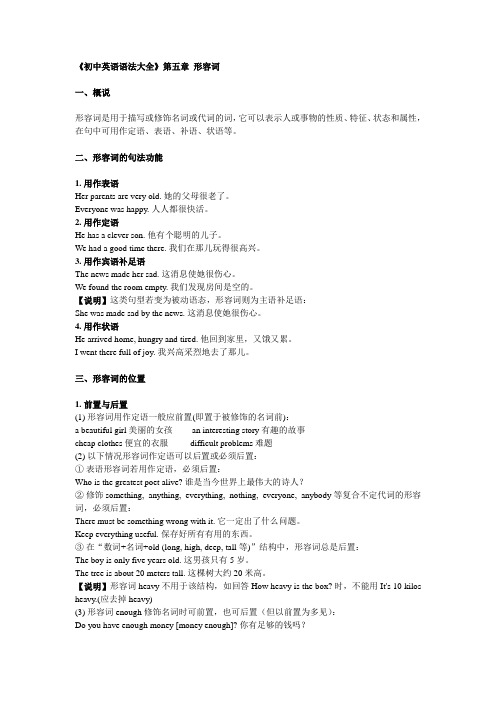
《初中英语语法大全》第五章形容词一、概说形容词是用于描写或修饰名词或代词的词,它可以表示人或事物的性质、特征、状态和属性,在句中可用作定语、表语、补语、状语等。
二、形容词的句法功能1. 用作表语Her parents are very old. 她的父母很老了。
Everyone was happy. 人人都很快活。
2. 用作定语He has a clever son. 他有个聪明的儿子。
We had a good time there. 我们在那儿玩得很高兴。
3. 用作宾语补足语The news made her sad. 这消息使她很伤心。
We found the room empty. 我们发现房间是空的。
【说明】这类句型若变为被动语态,形容词则为主语补足语:She was made sad by the news. 这消息使她很伤心。
4. 用作状语He arrived home, hungry and tired. 他回到家里,又饿又累。
I went there full of joy. 我兴高采烈地去了那儿。
三、形容词的位置1. 前置与后置(1) 形容词用作定语一般应前置(即置于被修饰的名词前):a beautiful girl 美丽的女孩 an interesting story 有趣的故事cheap clothes 便宜的衣服 difficult problems 难题(2) 以下情况形容词作定语可以后置或必须后置:①表语形容词若用作定语,必须后置:Who is the greatest poet alive? 谁是当今世界上最伟大的诗人?②修饰something, anything, everything, nothing, everyone, anybody 等复合不定代词的形容词,必须后置:There must be something wrong with it. 它一定出了什么问题。
初中英语语法大全-形容词

外教一对一初中英语语法大全-形容词语法要点形容词(adjective)表示事物(包括人)的性质和特征,修饰名词,有时也修饰复合不定代词。
例如:good students 好学生a clean river 一条干净的河流an interesting film 一部有趣的电影something important 重要的事物形容词在句中主要作定语、表语、状语和宾语补足语等。
形容词也可以作主语,但要在它前面加定冠词the,使之名词化。
1. 形容词在句子中的作用例句简析I have a new bike. 我有一辆新单车。
new 作bike 的定语Your mother looks very well. 你妈妈看起来十分健康。
well作表语The children were singing on the way, happy and healthful. 孩子们一路唱着歌,快乐而又健康。
happy and healthful作状语I find it difficult to learn English well. 我发现学好英语很困难。
well作宾语补足语外教一对一 The story is interesting. 这故事有趣。
interesting作表语The old and young in the whole village sang and danced that night. 那天夜晚,全村老老少少唱啊跳啊。
The old and young 作主语3. 形容词在句子中的位置作修饰语时,形容词大多置于被修饰的词之前,但在有些情形下形容词放在被修饰词之后;两个或两个以上形容词并列时,关系最密切的最贴近被修饰的名词。
4. 形容词比较级和最高级的构成形容词由原级变为比较级和最高级,有规则变化和不规则变化。
规则变化时,单音节词和少数双音节词在词尾加-er, -est,大部分双音节词和多音节词,在他们的前面加more, most;不规则变化有固定拼写,需要加强记忆。
初中英语语法之形容词的用法-讲解+习题

1.形容词的用法:形容词是指用来修饰、说明名词或不定代词,表示人或物的性质、特征和状态。
一般放在它所修饰的名词前作定语,也可独立作表语或宾语补足语等。
i. 作定语:This is an interesting story. Kitty is a clever cat.ii. 作表语:Yao Ming is very tall. Our classroom is big and bright.iii. 作宾语补足语:Don't make your hands dirty. We're trying to make our school beautiful.注意:a. 有些形容词只能作表语。
如:alone, afraid, asleep等。
如:That old man feels alone because his children are out. I'm afraid he can't come.b. 形容词与不定代词something, anything, nothing, everything等连用时,要放在这些词后面。
如:There is something wrong with my DVD machine. It's nothing serious.c. 某些形容词可以和定冠词连用,表示一类人或事物,其作用相当于一个名词。
如:the young(年轻人),the poor(穷人), the rich(富人)d. 如果有两个以上的形容词修饰同一个名词时,其前后排列顺序一般如下:限定词(a/the, this/some/her……)+数量词(先序数词后基数词)+观点+大小+形状+新旧+颜色+产地+材料+名词。
如:a big old German computer2.副词的用法:副词是用来修饰动词、形容词、其他副词或整个句子,有时也能修饰名词,表示时间、地点、方式、程度、动作、频度等,在句中主要用作状语。
初中英语语法之形容词副词
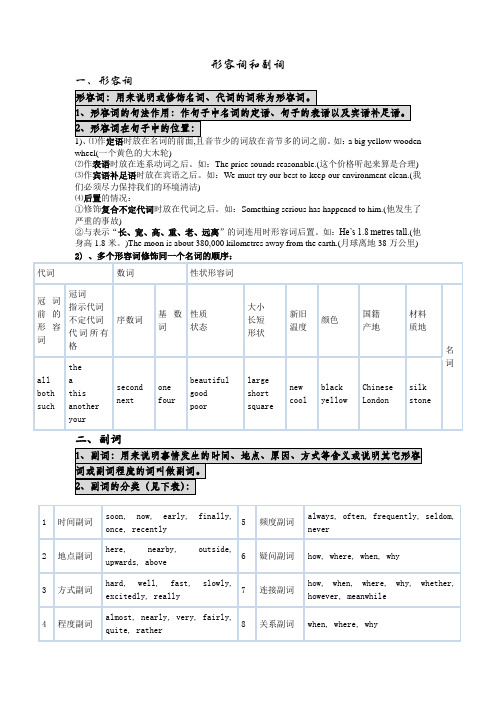
形容词和副词一、形容词wheel(一个黄色的大木轮)⑵作表语时放在连系动词之后。
如:The price sounds reasonable.(这个价格听起来算是合理)⑶作宾语补足语时放在宾语之后。
如:We must try our best to keep our environment clean.(我们必须尽力保持我们的环境清洁)⑷后置的情况:①修饰复合不定代词时放在代词之后。
如:Something serious has happened to him.(他发生了严重的事故)②与表示“长、宽、高、重、老、远离”的词连用时形容词后置。
如:He‘s 1.8 metres tall.(他身高1.8米。
)The moon is about 380,000 kilometres away from the earth.(月球离地38万公里) 2) 、多个形容词修饰同一个名词的顺序:1.时间副词:一般放在句首或句尾,注意,early、late、before、later、yet等一般放在句尾,already、just一般放在动词的前面。
如:We will visit the Great Wall tomorrow.(我们明天要去参观长城) / They have already been to the UK twice.(他们去过英王国两次) / Soon the lost boy found his way back home.(不久迷路的孩子找到了回家的路)2.地点副词:一般放在句尾,但here、there还可放在句首。
如:There you can see thousands of bikes running in all directions(方向).(在那里,你可以看到成千上万的自行车朝各个方向流动) / The frightened wolf ran away.(受到惊吓的狼逃开了)/ He walked out quietly and turned back soon.(他悄悄地走了出去,很快又返回)3.方式副词:一般放在行为动之后,suddenly可以放在句首、句尾或动词之前。
初中英语语法形容词副词

例题
1) Tony is going camping with ___ boys. A. little two other B. two little other C. two other little D. little other two
答案点拨:C 由"限定词--数词--描绘词--(大小,长短,形状,新 旧,颜色) --性质--名词"的公式可知数词,描绘词,性质依次顺序 只有C符合答案。
A. correct B. correctly C. correctness D. correcting
5. They watched a movie and felt quite __A___ .
A. sad B. sadly C. sadness D. sady
某些动词如make,paint,keep,find, like,want等后接名词或代词作宾语,再接 形容词作宾语补足语,补充说明宾语的状态、 特征等。形容词和宾语一起构成复合宾 语.有的已构成固定词组。
2) One day they crossed the ____bridge behind the palace. A. old Chinese stone B. Chinese old stone C. old stone Chinese D. Chinese stone old
答案点拨:A. 几个形容词修饰一个名词,他们的排列顺序是:年龄, 形状,大小+颜色+来源+质地+用途+国家+名词。
3.—What do you think of the story written by Mark Twain? —It is ___D___. I like it. [04昆明] A. boring B. bored C. interested D. interesting
初中英语语法大全:形容词和副词汇总
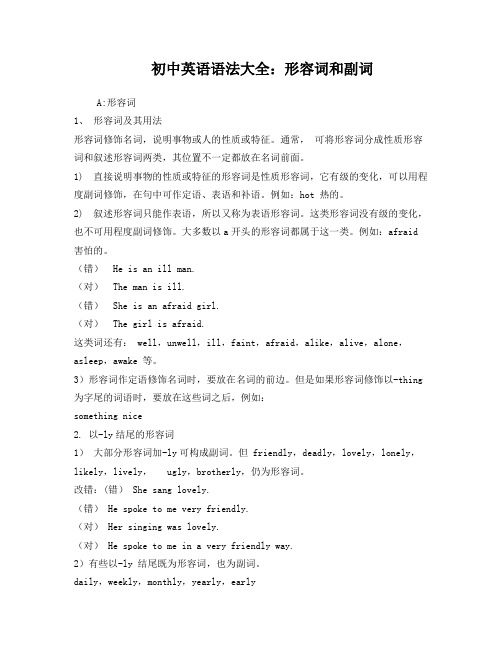
初中英语语法大全:形容词和副词A:形容词1、形容词及其用法形容词修饰名词,说明事物或人的性质或特征。
通常,可将形容词分成性质形容词和叙述形容词两类,其位置不一定都放在名词前面。
1) 直接说明事物的性质或特征的形容词是性质形容词,它有级的变化,可以用程度副词修饰,在句中可作定语、表语和补语。
例如:hot 热的。
2) 叙述形容词只能作表语,所以又称为表语形容词。
这类形容词没有级的变化,也不可用程度副词修饰。
大多数以a开头的形容词都属于这一类。
例如:afraid 害怕的。
(错)He is an ill man.(对)The man is ill.(错)She is an afraid girl.(对)The girl is afraid.这类词还有: well,unwell,ill,faint,afraid,alike,alive,alone,asleep,awake 等。
3)形容词作定语修饰名词时,要放在名词的前边。
但是如果形容词修饰以-thing 为字尾的词语时,要放在这些词之后,例如:something nice2. 以-ly结尾的形容词1)大部分形容词加-ly可构成副词。
但 friendly,deadly,lovely,lonely,likely,lively, ugly,brotherly,仍为形容词。
改错:(错) She sang lovely.(错) He spoke to me very friendly.(对) Her singing was lovely.(对) He spoke to me in a very friendly way.2)有些以-ly 结尾既为形容词,也为副词。
daily,weekly,monthly,yearly,earlyThe Times is a daily paper.The Times is published daily.3 用形容词表示类别和整体1)某些形容词加上定冠词可以泛指一类人,与谓语动词的复数连接。
初中英语语法 形容词在修饰性格时有哪些常用词汇
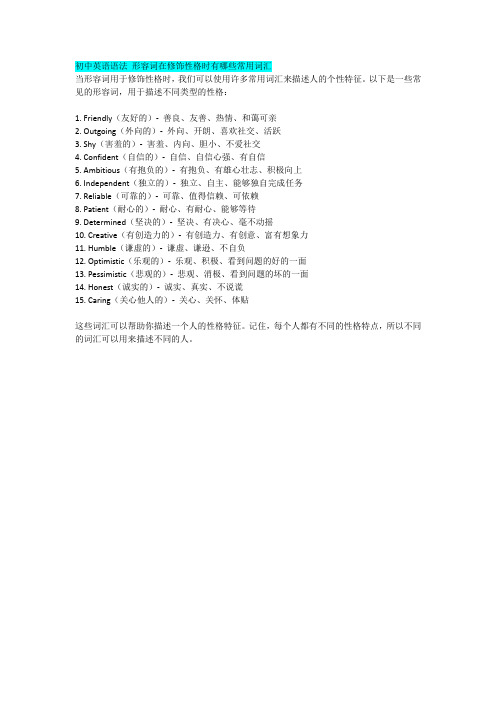
初中英语语法形容词在修饰性格时有哪些常用词汇
当形容词用于修饰性格时,我们可以使用许多常用词汇来描述人的个性特征。
以下是一些常见的形容词,用于描述不同类型的性格:
1. Friendly(友好的)-善良、友善、热情、和蔼可亲
2. Outgoing(外向的)-外向、开朗、喜欢社交、活跃
3. Shy(害羞的)-害羞、内向、胆小、不爱社交
4. Confident(自信的)-自信、自信心强、有自信
5. Ambitious(有抱负的)-有抱负、有雄心壮志、积极向上
6. Independent(独立的)-独立、自主、能够独自完成任务
7. Reliable(可靠的)-可靠、值得信赖、可依赖
8. Patient(耐心的)-耐心、有耐心、能够等待
9. Determined(坚决的)-坚决、有决心、毫不动摇
10. Creative(有创造力的)-有创造力、有创意、富有想象力
11. Humble(谦虚的)-谦虚、谦逊、不自负
12. Optimistic(乐观的)-乐观、积极、看到问题的好的一面
13. Pessimistic(悲观的)-悲观、消极、看到问题的坏的一面
14. Honest(诚实的)-诚实、真实、不说谎
15. Caring(关心他人的)-关心、关怀、体贴
这些词汇可以帮助你描述一个人的性格特征。
记住,每个人都有不同的性格特点,所以不同的词汇可以用来描述不同的人。
初中英语必背形容词

初中英语必背形容词1. Beautiful - 美丽的Example: She has a beautiful smile.2. Tall - 高的Example: He is tall for his age.3. Funny - 有趣的4. Smart - 聪明的Example: She is a smart student and always gets good grades.5. Kind - 友善的Example: He is a kind person who always helps others.6. Brave - 勇敢的Example: The firefighter showed bravery when rescuing people from the burning building.7. Hardworking - 努力的8. Honest - 诚实的Example: He is known for his honesty and never tells lies.9. Generous - 慷慨的Example: She donated a large sum of money to the charity, showing her generosity.10. Creative - 富有创造力的Example: The artist's work is always creative and unique.11. Patient - 耐心的Example: The teacher was patient with his students when they had difficulty understanding.12. Responsible - 负责任的13. Polite - 有礼貌的Example: She always speaks politely and treats others with respect.14. Energetic - 精力充沛的Example: The children were very energetic and played games all afternoon.15. Honest - 诚实的Example: He is known for his honesty and never tells lies.以上是初中英语必背的一些常用形容词。
初中英语语法讲解 形容词讲解
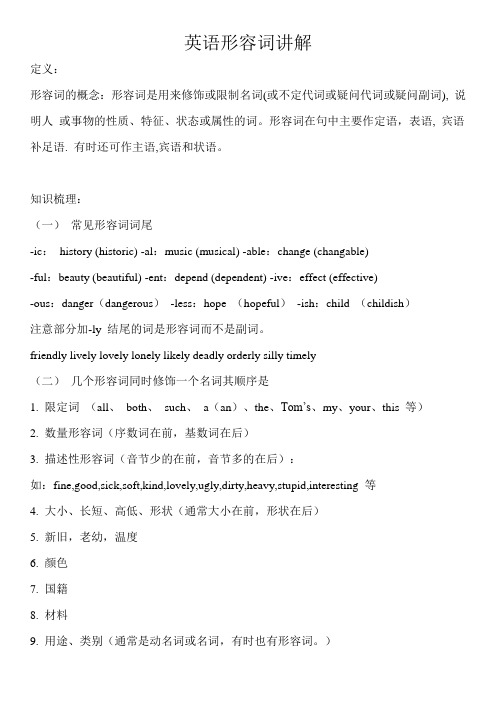
英语形容词讲解定义:形容词的概念:形容词是用来修饰或限制名词(或不定代词或疑问代词或疑问副词), 说明人或事物的性质、特征、状态或属性的词。
形容词在句中主要作定语,表语, 宾语补足语. 有时还可作主语,宾语和状语。
知识梳理:(一)常见形容词词尾-ic:history (historic) -al:music (musical) -able:change (changable)-ful:beauty (beautiful) -ent:depend (dependent) -ive:effect (effective)-ous:danger(dangerous)-less:hope (hopeful)-ish:child (childish)注意部分加-ly 结尾的词是形容词而不是副词。
friendly lively lovely lonely likely deadly orderly silly timely(二)几个形容词同时修饰一个名词其顺序是1. 限定词(all、both、such、a(an)、the、Tom’s、my、your、this 等)2. 数量形容词(序数词在前,基数词在后)3. 描述性形容词(音节少的在前,音节多的在后):如:fine,good,sick,soft,kind,lovely,ugly,dirty,heavy,stupid,interesting 等4. 大小、长短、高低、形状(通常大小在前,形状在后)5. 新旧,老幼,温度6. 颜色7. 国籍8. 材料9. 用途、类别(通常是动名词或名词,有时也有形容词。
)10. 最后才是名词如five beautiful large black Italian winter coats (234679)two fat middle-aged American doctors (2457)(三)形容词的比较级和最高级1)单音节和部分双音节词(以-er,-ow,-y)(ly 除外)结尾的词,一般直接加er,est yellow yellower tall taller tallest2)以-e 结尾的单词,直接加r,st large larger largest;3)闭音节单音节词,若末尾只有一个辅音字母,要双写这个辅音字母,然后再加-er,-est big bigger biggest4)以辅音字母加y 结尾的单音节和部分双音节词(以-ly 后缀的词除外)要去y 加ier iest early earlier earliest5)不规则变化good/ well(身体好) better bestbad/ ill worse worstmany/ much more mostlittle less leastfar farther farthest (具体意义;更远,最远)far further further(抽象意义;)old older/ elder oldest/ eldest6)两者比较要用比较级“比较级+than”或“less(more)…than”比较级前可用“far,much,even,still,a little,a lot a bit”修饰,表示程度Mike is a little taller than Bob比较级+比较级,表示越来越Our life is better and better.Shanghai is becoming more and more beautiful.the +比较级,the +比较级,表示越……就越……The sooner,the better.7)三者或三者以上比较要用最高级,可用the+最高级+比较范围(of/in/among+范围)Wales are the largest animals in the world.one of +the+形容词最高级+名词复数,表示“最……之一”one of the oldest countries in the world8)as…as;not as/so…as 表示同级比较“与…一样”“不及…”考点注意:1. 原级,比较级,最高级三者的转换。
初中英语语法(形容词,副词).doc

初中英语语法(形容词,副词)1.形容词:翻译成中文“……的”,这种词就是形容词,他是用来修饰名词的。
2.形容词修饰名词时一般放在名词的前面,但是一下情况例外:1.被修饰的是不定代词:something, nothing, anything….时,形容词必须放在代词后面:I have something important to tell you.我有一些重要的事情要告诉你。
2.当形容词要与数词短语+away/long/wide/high/deep/thick/old 一起使用的时候,形容词要后置The street is about 20 meters wide.这条大街大概有二十米宽。
3.多个形容词修饰名词的排列顺序是:性尺形,年颜产,材用名one of my grandpa’s old brown American oak writing desk我爷爷的一个旧的,褐色的美国的橡木的写字桌4.连系动词后面加形容词连系动词分成:变变变,(be, become, go, get, come, turn, grow)感光动词(look, sound, taste, smell, feel, seem, appear)5.-ing结尾的形容词与-ed 结尾的形容词的比较:-ing用来修饰物,interesting, boring, exciting, worrying-ed用来修饰人的感觉, interested , bored, excited, worriedI’m interested in this interesting book. (我对这本有趣的书很感兴趣)7. the + 形容词:表示一类人the rich (富人)the poor(穷人)the blind (盲人)这种表达值得是一类人,所以后面的动词要用复数。
The poor are very happy. 穷人们很开心。
6.形容词的三个级的用法:原级比较级最高级两者同一性质的东西两者同一性质的东西在一个范围中as tall as taller than the tallest in the class He is as tall as her. He is taller than her. He is the tallest boy in our class.7.形容词的三个级在三笔中的用法要牢记:1.as…as possible 尽可能地as son as possible 尽快He ran as quickly as possible. 他跑的尽可能地快。
初中英语语法讲解-形容词

4.Sam is153cm______ and he will be30cm_______.
A.tall ... tall B. taller ... taller C. tall ... taller D. taller ... tall
授课讲义
形容词
形容词是用来表示人或事物的性质、状态和特征的一种词类,它用于形容词或修饰名词或者代词对名词或者代词加以说明或限制,在句子中科做表语,定语等。一般放在所修饰的名词前,表示名词的特点和属性。也可用于BE动词后,表示事物的状态。
形容词的用法
1)在句中作定语,放在名词前:
She is agoodstudent, and she works hard.
7.My teacher is _______ today. She is in bed.
A.well B. good C. ill D. easy
8.Is there ________ with this computer?
A.wrong something B. wrong anything C. anything wrong D. something wrong
主语+谓语(系动词)+the+形容词最高级+名词+表示范围的短语或从句(of / in)
注意:in+范围,场所
of +复数(与主语同一类的人或事物)
He is the tallest boy in our class.
Lucy is the youngest girl of the three girls.
This is aredbag.
初中英语语法专题讲座10——形容词

初中英语语法专题讲座——形容词【复习要点】一、形容词的基本用法:形容词是用来修饰名词或代词的,在句中可用作定语、表语和宾语补足语等。
⑴用作前置定语,即放在名词前修饰该名词。
例如:China is a great country witha long history. 中国是一个历史悠久的国家。
⑵用作后置定语。
形容词修饰不定代词或形容词短语修饰名词时,需要后置。
例如:He has something important to tell you.他有重要的事告诉你。
She is a girl good at singing. 她是一位擅长唱歌的女孩。
⑶用作表语。
例如:It was rainy yesterday, but today it is sunny. 昨天下雨,今天天晴。
Your mother seems angry. 你母亲看上去生气了。
The milk in the glass has gone bad. 玻璃杯里的牛奶发臭了。
The leaves turn yellow in autumn. 树叶在秋天变黄。
注意:有一些形容词在句中只能用作表语,我们称之为“表语形容词”。
初中英语中常见的表语形容词有:afraid, alive, alone, asleep, glad, ill (生病的), ready, sorry, sure, unable, well (健康的)等。
例如:I’m sorry not to have been ready for the party. 很抱歉,晚会我还没有准备好。
The children were asleep just now, but now they’re awake.孩子们刚才在睡觉,现在醒了。
They were unable to help us. 他们没法帮助我们。
⑷用作宾语补足语。
例如:The news made her happy. 那个消息使她很开心。
【初中英语】初中英语语法大全之形容词
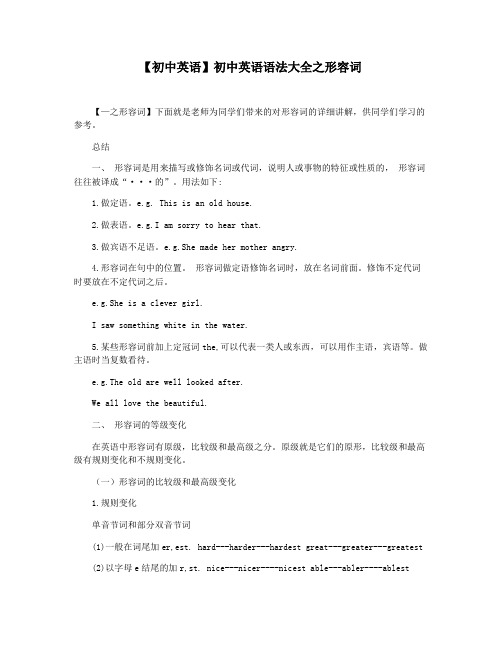
【初中英语】初中英语语法大全之形容词【—之形容词】下面就是老师为同学们带来的对形容词的详细讲解,供同学们学习的参考。
总结一、形容词是用来描写或修饰名词或代词,说明人或事物的特征或性质的,形容词往往被译成“···的”。
用法如下:1.做定语。
e.g. This is an old house.2.做表语。
e.g.I am sorry to hear that.3.做宾语不足语。
e.g.She made her mother angry.4.形容词在句中的位置。
形容词做定语修饰名词时,放在名词前面。
修饰不定代词时要放在不定代词之后。
e.g.She is a clever girl.I saw something white in the water.5.某些形容词前加上定冠词the,可以代表一类人或东西,可以用作主语,宾语等。
做主语时当复数看待。
e.g.The old are well looked after.We all love the beautiful.二、形容词的等级变化在英语中形容词有原级,比较级和最高级之分。
原级就是它们的原形,比较级和最高级有规则变化和不规则变化。
(一)形容词的比较级和最高级变化1.规则变化单音节词和部分双音节词(1)一般在词尾加er,est. hard---harder---hardest great---greater---greatest(2)以字母e结尾的加r,st. nice---nicer----nicest able---abler----ablest(3)重读闭音节中末尾只有一个辅音字母时,双写辅音字母,再加er,est.big---bigger---biggest (另外还有fat, red,hot,wet,sad,mad ,thin )(4) 以 -y 结尾,但 -y 前是辅音字母的形容词的比较级和最高级是把 -y 去掉,加上 -ier 和-est 构成. happy (原形) happier (比较级) happiest (最高级)(5)双音节和多音节形容词的比较级和最高级需用more 和 most 加在形容词前面来构成。
- 1、下载文档前请自行甄别文档内容的完整性,平台不提供额外的编辑、内容补充、找答案等附加服务。
- 2、"仅部分预览"的文档,不可在线预览部分如存在完整性等问题,可反馈申请退款(可完整预览的文档不适用该条件!)。
- 3、如文档侵犯您的权益,请联系客服反馈,我们会尽快为您处理(人工客服工作时间:9:00-18:30)。
Make sentences: 我发现这个故事很趣:
I find the story interesting. 请保持教室干净。
• Mike is 175cm, Peter is 175 cm, too.
Mike is as tall as Peter. Mike is 175 cm, so is Peter. Both Mike and Peter are 175 cm. tall.
倍数表达
1. The new playground is _______ the old one.
4._____ children there are in a family, ____ their life will be, especially in the country.
A. The less; the better B. The fewer; the better
C. Fewer; richer
A=B A≠B A是B的几倍
as+原级+as not so +原级 +as
倍数+as +原级 +as
表示程度的递增 两种情况同时变化
比较级+and+比较级 the+比较级,the+比较级
Exercise
1.The ice in the lake is about one meter____t_h.iIctk’s strong enough to skate on.
in it.
总结:V-ing使人…的; V-ed感到…的
使人兴奋的 / 感到激动人心的 exciting / excited
使人吃惊的 / 感到惊讶的 surprising / surprised
令人害怕的 / 感到可怕的 frightening / frightened
令人震惊的 / 感到惊诧的 amazing / amazed Some example: You will be __e_x_c_itbeyd our ______exhcaiitrisntgyles.(excite)) He is very __in__te_r_e_steidn the _______in_teresstotirnyg.
(big) • 4. 解释句子: • The Changjiang River is the longest river in
China.
The Changjiang River is longer than any other river in China.
• This is the worst film that I have seen for years.
(interest)
形容词考点4)形容词比较级和最高级
不规则变化
▪ good / well---- better ----best ▪ badly/ bad / ill ---- worse-----worst ▪ many/much— more—most ▪ little ----- less-----least ▪ old ---- older----oldest
形容词考点5) 形容词做宾语补足语
这个消息使每个人高兴.
Period 2
This news made everyone happy. 这个消息使每个人感到惊奇.
This news made everyone surprised. 常见接宾语补足语的动词:make, find, keep, think
_______s_ic_k_/_il.l
(sick / ill)
5.In the game, the boys and girls should keep their mouths_____ and their eyes______.
A. opened; closed
B. opening; closing
形容词考点2)系动词+ 形容词
这个主意听起来很好. The idea sounds wonderful. be; smell, taste, sound, look, feel; get, turn, become,
go; stay, keep; seem
1. --- What delicious cakes!
A. interested; interested B. interested; interesting C. interesting; interesting D. interesting; interested
4.The _s_i_c_kboy was lying on the bed because he is
D. More; the poorer
5.The car is running _______. It seems to be flying.
A. more and faster B. more and fast
C. fast and fast
D. faster and faster
Paraphrase
= I have never seen such a bad film before.
as…as…和not so …as…及其它 1.I think speaking is as ______ as reading. A. important B. the most important C. more important D. importer 2.If you like the beef, you can have as ___ as you can.
C. open; closed
D. opened; close
6.This egg smells ____, though it looks all right.
A. good B. well C. bad D. badly
比较级
1.Either of them can take this job, but what I’m
最高级
1.Jim always comes to school ____ of all because he has to open the door for others.
A. early
B. earlier
C. most early D. the earliest
2.---Of all the students, she looks ______.
interested in is who is ______.
A. more careful B. the most careful C. even careful
2.My ____ brother is four years _____ than I.
A. elder; elder B. elder; older C. older; eldest
A. much better
B. more worse
C. more better
D. much worse
6.Of the two Australian students, Masha is _____ one. I think you can find her easily.
A. tallest B. the taller C. taller D. the tallest
3. China is larger than______ in Africa.
A. any country
B. any countries
C. any other country D. any other countries
4.The beds in this room are _____ in that room.
take a walk around it. A. wonderfully B. famous C. beautiful D. well
形容词考点3) V-ed和V-ing区别
e interested or interesting to fill in the blanks. The book is very ____i_n_te_r_e_satinndg we are all ________i_n_te_rested
Period1 Revision
形容词考点1) 形容词修饰名词 我得到了一顶新的丝绸帽子. I got a new silk cap. 我有些重要的事情要告诉你. I have something important to tell you. anything new something interesting
A. higher than those
B. higher than
C. much higher than
D. more higher than that
5. Now the air in our hometown is ____ than it was
before. Something must be done.
A. twice bigger
B. as twice as big as
C. as twice big as D. twice as big as
2.你们学校是他们的三倍那么大。 Your school is three times as large as theirs.
这座大桥比那座长300米。 This bridge is 300 meters longer than that one.
elder----eldest ▪ far ---- farther-----farthest
further-----furthest
The uses of the degrees of adj. and adv. 不同级的用法
